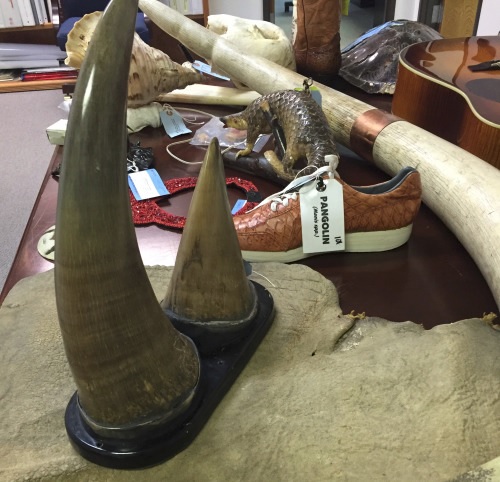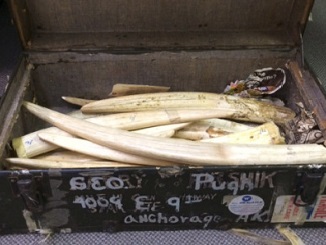 When Sheila O’Connor talks about wildlife trafficking, you can feel her passion for protecting our natural resources. It’s obvious that her feelings run deep – much deeper than just a job.
When Sheila O’Connor talks about wildlife trafficking, you can feel her passion for protecting our natural resources. It’s obvious that her feelings run deep – much deeper than just a job.
Sheila is the Resident Agent in Charge for Oregon for the U.S. Fish and Wildlife Service’s Office of Law Enforcement. In short, Sheila oversees a small but dedicated staff of law enforcement professionals who work to curb Federal wildlife law violations, which includes anything from poaching to wildlife smuggling and trafficking. Those violations can include endangered species, migratory birds, marine mammals and even plants and insects.
“Wildlife trafficking is a big deal everywhere in the United States and the Pacific Northwest is no exception,” Sheila said during a recent media interview at her office. “Basically, wildlife trafficking is the illegal buying, selling, importing, exporting or killing of wildlife that is protected at one level or another.”
Sheila’s office was the lead for Operation Pongo, which led to the conviction of two smugglers who were shipping orangutan skulls and other exotic wildlife to Portland.
The summer travel season is a prime time for travelers heading outside the United States to inadvertently purchase souvenir items that are illegal to bring back to America.
I asked Sheila about what people should be aware of when purchasing items in foreign shops. What I got was a genuine plea to stop fueling the illegal wildlife trade.
“Just because something is for sale in a foreign country, doesn’t mean it is legal. Just because you see it for sale, it doesn’t mean it’s legal in that country. And if it is legal in that country, it doesn’t mean that it’s legal to bring back into the United States. A big tourist item you could really get yourself in trouble with is elephant ivory. There are a lot of smaller carved items like statues, jewelry, beads, and ear rings made from ivory,” Sheila said, her determination building with each word.
Watch the full interview with Sheila: http://bit.ly/294M2XX
Find more travel tips and facts: https://www.fws.gov/le/tips-for-travelers.html
General information for travelers: https://www.fws.gov/le/travelers.html
“Right now the elephant poaching crisis is huge. Every 15 minutes an elephant is illegally killed for its ivory. Don’t be a part of that. You can’t tell if it’s old or new; you can’t tell if it’s coming from an elephant poached yesterday or from one killed a long time ago. And it doesn’t matter. Elephants are killed at a rate faster than they can reproduce. And the same with rhino horns. Rhinos are also being killed at a rate faster than they can reproduce.
“Do the math! What will happen if that continues? We know what will happen – they will go extinct! If we don’t change the way we handle ivory and rhino horn and other endangered species, they all will go extinct. The fastest way to drive a species to extinction is to commercialize it. Don’t be a part of that.”
Sheila then offered her advice for doing your part to end the illegal wildlife trade.
“Buyer beware! Most people if they knew the brutality behind some of this stuff, they wouldn’t want to be part of it to begin with. If you’re concerned about it, and you don’t know the origin, then don’t buy it. If you want a souvenir, then take a selfie.
“It’s to the point where we can either have wildlife trafficking or we can have wildlife.”
Well said Sheila. Very well said.
By Brent Lawrence
Brent Lawrence is a Public Affairs Officer with the U.S. Fish and Wildlife Service’s Pacific Region based in Portland, Oregon.
